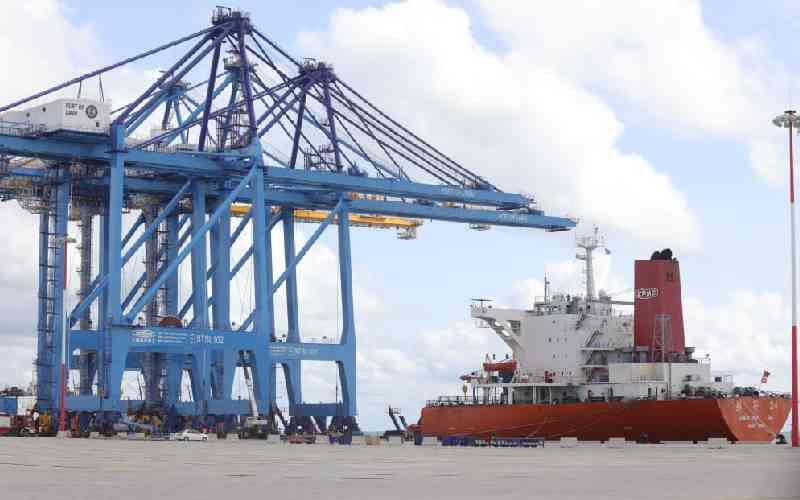President Uhuru Kenyatta’s announcement, earlier this week, that the much anticipated construction of the Lamu project would begin next month was received with a sigh of relief not only in Kenya, but also in the other six African countries that will benefit from its completion.
To underscore the inter-continental importance of the Lamu Port South Sudan Ethiopia Transport (Lapsset) corridor, the project will enjoy the close attention of the Heads of State from seven African countries on the African Union Commission and the New Partnership for African Development (Nepad).
The Heads of State in the committee will be assigned responsibility and accountability for implementing the various components of the project whose construction will kick-off with the construction of three of the 32 berths. The contract for the three berths was awarded last year to a Chinese firm.
It should be a matter of deep concern to every Kenyan that despite Lapsset’s great significance and its catalytic role in unlocking economic development along the Coast and Northern Kenya, the project that should have started last October, has been held hostage to the personal interests of a few greedy individuals hiding in the shadows many of whom acquired their land titles in a questionable manner. The untoward delays were due to wrangles over lists of beneficiaries.
What is even more regrettable is the realisation that these wrangles were fuelled by people working for Government ministries, departments and agencies. Although Kenyans are not holding their breath, they are waiting to see the action the government takes against these individuals who frustrated its work while receiving salaries and allowances from the public purse.
Accountability
Indeed, these individuals’ reckless actions led to a deterioration of the security on the ground to the extent that scores of lives were lost and property worth millions of shillings was destroyed. This prompted the government to launch investigations that, in the words of President Kenyatta, “uncovered irregular land allocations in Lamu including land reserved for the port.” The President termed the land-grab part of a criminal conspiracy.
Perhaps, time has come for the Government to wake up to the dangers and the huge losses suffered in the public purse whenever projects requiring huge tracks of land are mooted. Evidence on the ground suggests that some of the public officials involved in the planning of these projects connive with latter-day carpetbaggers and acquire these parcels of land in anticipation of huge pay-offs. Ironically, the amounts to be paid out are often determined by these same public officials who, in addition, supervise the exercise. The result is there is little, if any, transparency and accountability in the entire process.
One way of dealing with these rampant shenanigans that have, sadly, come to be viewed as business-as-usual is for the National Assembly to pass legislation specifying the number of years a property must have been in the possession of the person or company seeking compensation.
The implementation of such laws would be relatively easy because most of the land on which these projects are to be built are usually owned communally and do not have individual title deeds. Indeed, the ownership of an individual title-deed on communal land should set off alarm bells ringing signalling that something was not right.
The national government would do well to ensure these laws are passed before the results of a geophysical aerial survey mooted last November are ready. Failure to pass this legislation would mean that the Sh6.2 billion national survey to show where various minerals are found will end up benefitting only a small number of well-heeled individuals who are also well-connected.
These people are likely to get prior information about the results of the survey, which they will use to acquire the prime pieces of land.
The results — especially in areas where these individuals are either the local political leaders or have access to those leaders — will be heightened insecurity fanned by bogus inter-community rivalries. The loss of lives and property is the inevitable consequence.
It is a sad commentary on the country that the beneficiaries often consider the deaths and property losses as collateral damage and,often, get away scot-free. At times, they even get elected to higher offices.
—[email protected]
Stay informed. Subscribe to our newsletter
 The Standard Group Plc is a
multi-media organization with investments in media platforms spanning newspaper
print operations, television, radio broadcasting, digital and online services. The
Standard Group is recognized as a leading multi-media house in Kenya with a key
influence in matters of national and international interest.
The Standard Group Plc is a
multi-media organization with investments in media platforms spanning newspaper
print operations, television, radio broadcasting, digital and online services. The
Standard Group is recognized as a leading multi-media house in Kenya with a key
influence in matters of national and international interest.
 The Standard Group Plc is a
multi-media organization with investments in media platforms spanning newspaper
print operations, television, radio broadcasting, digital and online services. The
Standard Group is recognized as a leading multi-media house in Kenya with a key
influence in matters of national and international interest.
The Standard Group Plc is a
multi-media organization with investments in media platforms spanning newspaper
print operations, television, radio broadcasting, digital and online services. The
Standard Group is recognized as a leading multi-media house in Kenya with a key
influence in matters of national and international interest.







